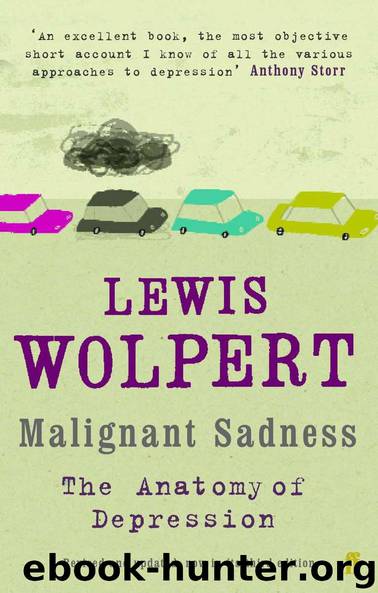Malignant Sadness by Wolpert Lewis

Author:Wolpert, Lewis [Wolpert, Lewis]
Language: eng
Format: epub
ISBN: 9780571266715
Publisher: Faber
Published: 2011-05-04T22:00:00+00:00
There is a strong link between attachment theory and Aaron Beck’s most influential cognitive theory of emotional states, especially depression. It is a theory that can be thought of as dealing with the malignant invasion by emotions, particularly sadness, of cognitive processes, together with the effect of conscious thoughts on the emotions themselves. Cognitive theory says that certain beliefs about ourselves, other people and events develop from an early age. These beliefs are like the models referred to in attachment theory and are encoded at an early age in terms of phrases like ‘I am unlovable’ and ‘I am incompetent’. These beliefs may be generated by the nature of the attachment that develops in infancy as well as later experiences including separations and other losses and traumas.
Beck has proposed the term schema to describe the patterns of thinking that maintain a depressed patient’s self-defeating and pain-inducing attitudes even when objective evidence for positive factors is present. The assumptions in a depressed individual are dysfunctional because they are rigid and not necessarily related to reality. For example, if someone believes he or she is incompetent there is a constant striving to be successful at all times, even if the goals set are unrealistic. The so-called cognitive triad has been used to characterise depression and consists of the individual’s dysfunctional view of the self, of the world and of the future. In the inner world of the depressive, the self is seen as defective and inadequate; the outside world is seen as presenting insuperable obstacles; and there is the conviction that the depression will continue for ever – that the future is hopeless. An essential feature of the theory is that such negative thoughts are automatic.
When, some 25 years ago, Aaron Beck was developing his ideas about cognitive therapy, the main theories about emotional disorder shared the assumption that the patient is under the control of concealed negative forces over which he or she has no control; for example, that unconscious elements are sealed off by conscious barriers which only psychoanalysis can penetrate. Beck came to the conclusion that this was wrong, as it failed to take into account the person’s conscious thoughts. Beck was himself a psychoanalyst and had been practising psychoanalysis for many years before he realised that the patient’s conscious thoughts could have an important effect on both emotional states and behaviour. He found that patients had two simultaneous streams of thought, one of which might be hostility towards the analyst and which was expressed, while the other, unexpressed, was self-critical, for example, ‘I have said the wrong thing to him … I’m bad’. These negative thoughts were rarely noticed by the patient and seemed to happen automatically, almost autonomously.
Beck proposed that the patient is, in principle, able with help to understand and deal with a psychological disorder like depression. In these terms the aim of the therapist is to help the patient unravel distortions in thinking and to learn alternative, more realistic ways to formulate and deal with problems.
Download
This site does not store any files on its server. We only index and link to content provided by other sites. Please contact the content providers to delete copyright contents if any and email us, we'll remove relevant links or contents immediately.
Should I Stay or Should I Go? by Ramani Durvasula(7667)
Why We Sleep: Unlocking the Power of Sleep and Dreams by Matthew Walker(6720)
Fear by Osho(4734)
Flow by Mihaly Csikszentmihalyi(4697)
Rising Strong by Brene Brown(4459)
Why We Sleep by Matthew Walker(4440)
The Hacking of the American Mind by Robert H. Lustig(4381)
How to Change Your Mind by Michael Pollan(4356)
Too Much and Not the Mood by Durga Chew-Bose(4345)
Lost Connections by Johann Hari(4183)
He's Just Not That Into You by Greg Behrendt & Liz Tuccillo(3900)
Evolve Your Brain by Joe Dispenza(3677)
The Courage to Be Disliked by Ichiro Kishimi & Fumitake Koga(3503)
Crazy Is My Superpower by A.J. Mendez Brooks(3400)
In Cold Blood by Truman Capote(3384)
Resisting Happiness by Matthew Kelly(3340)
What If This Were Enough? by Heather Havrilesky(3311)
The Book of Human Emotions by Tiffany Watt Smith(3309)
Descartes' Error by Antonio Damasio(3277)
